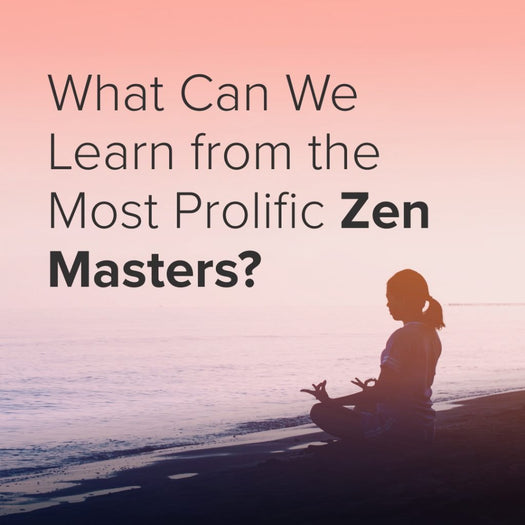What We Can Learn From the Most Prolific Zen Masters?

Today, we often hear the term Zen master used when referring to someone who manages to keep their cool in stressful situations. Historically, however, the term has served as a catch-all for various titles across Zen traditions—including seike, roshi, sensei, osho. It’s an honorable title reserved for those who’ve essentially made a life commitment to the study, practice, and teachings of Zen Buddhism. And while these teachings might seem distant and irrelevant, there are many lessons we can learn from these Zen masters that apply not only to the time on our meditation cushion, but also to our everyday life.
Zen Master #1: Thich Nhat Hahn
Learn to love your enemies
Thich Nhat Hahn (pronounced “Tik Not Han,”), born in 1926, is a Vietnamese Buddhist monk, widely known for his global peace activism. He also founded Engaged Buddhism—a type that emphasizes using mindfulness in everyday activities like walking, cooking, and listening, as well as in social action (1).
Of Nhat Hahn’s 100+ published books and vast teachings, he’s perhaps most famous for his nonviolent approach to conflict. His solution? Learn to love your enemies. While that may seem impossible to practice, his unique perspective and insight might help.

To illustrate his point, Nhat Hahn has often told a harrowing story of sea pirates robbing and violating innocent travelers. He says our natural instinct is to get angry at the pirates who’ve robbed us or the government officials who’ve abused their power. But he believes this approach misses the root of the issue:
“To remove only the bombs and nothing else is naive. Becausethe bombs are the fruit of the tree. And if we don’t look at the
tree and the roots, we are going to have more bombs (2).”
He says our degree of awakening—our way of life—is the root of everything. So when we’re faced with a difficult person, instead of getting angry, we should ask ourselves: Why are they like that? In what way has our society (and their upbringing) led to this outcome?
Most importantly, this can remind us that if we were born and raised in the same conditions, we could have turned out just like them. Zen master Nhat Hahn says it’s from this viewpoint that we can act from a place of love and stop blaming.
Zen Master #2: Shunryu Suzuki
Keep a beginner’s mind
Shunryu Suzuki (1904-1971), often called Suzuki Roshi, was a Japanese Zen Monk and teacher who helped popularize Zen Buddhism in the US. He founded the first Buddhist monastery outside of Asia as well as one of the most influential Zen organizations in the US—the San Francisco Zen Center.

Suzuki’s wisdom lives on through his works which include Zen Mind, Beginner’s Mind—one of the most popular books on Zen and Buddhism in the West (3). In it, he highlights the value of keeping a beginner’s mind in any endeavor:
“In the beginner’s mind there are many possibilities, but in the
expert’s there are few (4).”
He says many of us have the tendency to overintellectualize and get so close to Zen (or any practice) so as to miss what it’s all about. But with a beginner’s mind, he says we can stay curious, and keeping this curiosity is the purpose of all Zen teaching— “to make you wonder and to answer that wondering with the deepest expression of your own nature (5).”
Learn more about beginner’s mind >
Zen Master #3: Philip Kapleau
There is value in every experience
Philip Kapleau (1912-2004) is known as one of the founding fathers of American Zen. His goal? To bridge the gap between theory and practice and make Zen Buddhism accessible to everyone. Born in New Haven, CT, his path to being a zen master wasn’t linear like many of his peers. He was a court reporter covering the Toyko War Crimes Trials in Japan when he discovered Zen Buddhism.

Two decades later, he founded the well-known Rochester Zen Center in western NY (6). As in the roundabout way he came to Zen and adopted its teachings, one of Kapleau’s central teachings was around the simple belief that there is value in every experience.
In addition, he popularized the saying “grist for the mill,” which highlighted this tenet of his philosophy (4). All of our challenges and missteps along the way that might seem like mistakes, can be useful or provide some value, even if it’s not immediately apparent.
Zen Collection in the Muse App
From these zen masters, we can begin to see how practical and relevant their teachings are for our lives today—and that we don’t need to escape to a far-flung monastery to practice them. In the Zen Collection of our Muse app, we’ve worked to bring more of these practical Zen teachings and insights to light. With our Zen teachers, you can explore basic Zen meditation practices and Buddhist wisdom to apply to everyday life.
Sources:
- Plum Village – Mindfulness Practice. https://plumvillage.org/mindfulness-practice/
- Nhat Hahn, Thich. Peacemaking: How to Be It, How to Do It. 2002. https://www.goodreads.com/book/show/893209.Peacemaking
- Buddhism: Zen: Contemporary Masters & Teachings. University Libraries. University at Buffalo. 2020. https://research.lib.buffalo.edu/buddhism/zen-contemporary-masters#s-lg-box-wrapper-26167902
-
The Three Pillars of Zen. Project Gutenberg Self-Publishing Press.
http://self.gutenberg.org/articles/eng/The_Three_Pillars_of_Zen - Suzuki, Shunryu. Zen Mind, Beginner’s Mind. 2011. https://www.worldcat.org/title/zen-mind-beginners-mind-informal-talks-on-zen-meditation-and-practice/oclc/751722033
- Philip Kapleau. Encyclopedia Britannica website. https://www.britannica.com/biography/Philip-Kapleau
